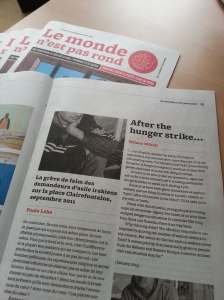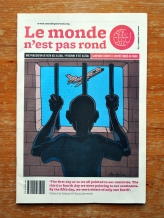In September 2011, a group of asylum seekers from the Assyrian minority in Iraq, led by Wilson Mikail, set up camp at the Place Clairefontaine, just outside the Ministry of Foreign Affairs in Luxembourg Ville. Having waited over 14 months for their applications for international protection to be processed without receiving any news, they began a hunger strike.
For several days, they were ignored by passers-by, the media, and the Ministry. Even the nearby statue of Grand Duchess Charlotte – a refugee in London during World War II, and an important symbol of national unity in Luxembourg – appeared to be looking the other way.
To help give visibility to their cause – and to their deteriorating physical condition -, local professional and artistic photographer Paulo Lobo (a migrant himself, having arrived in Luxembourg with his parents at the age of 6) visited Wilson Mikail and fellow hunger strikers on several occasions. Paulo Lobo’s black-and-white photographs, and his description of the scene (in French), are published in Issue 1 of the Le monde n’est pas rond newspaper, and on his blog.
After 21 days without food, the Luxembourg government agreed to give the hunger strikers an interview date. Eight months later, Wilson Mikail’s permanent residency (titre de séjour) was approved; others are still waiting. The good news for Wilson was tinged with grief – his mother died in Australia on the same day. As he explained to the English edition of Wort.lu in June 2012, “At that time I didn’t feel anything about it because I had lost the most important person in my life: my mum. At the same time I consider God took away something very special in my life and he gave me a different life to start with”.

Wilson Mikail’s new life in Luxembourg is still starting, at a slow pace. He lives with his wife and 15-year old daughter in a foyer (public shelter), with ten other families, whilst his search for a job drags on. Without a work contract, it is impossible for the family to rent an apartment. It has been over a decade since Wilson last practised his vocation as an engineer; he has also worked as a security guard in Greece, and has a licence to drive heavy-goods vehicles. His wife is a qualified hairdresser, and their 15-year-old daughter has mastered French and Luxembourgish at a local state school.
Wilson hopes to find a job soon, and before he and his family are asked to leave the foyer. It’s an ardent, day-to-day psychological battle, all the more necessary to overcome in order to keep his daughter motivated. As he explains in his lines published in the printed edition of Le monde n’est pas rond: “Faced with this situation, young people are losing hope, let alone their dignity. For those of us who escaped dangerous situations in countries like Iraq, Iran, Syria and Somalia, there is no way back”.
In the video below, recorded at the time of the hunger strike, Wilson Mikail explains the reasons for their action (in English), followed by a reflection by Claude Frentz of Personne n’est illégal (in Luxembourgish).






